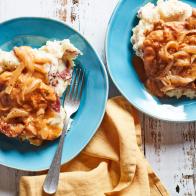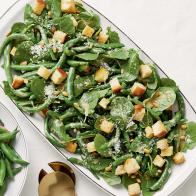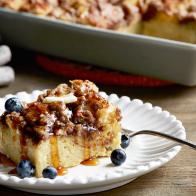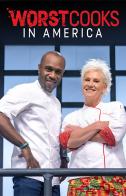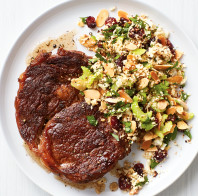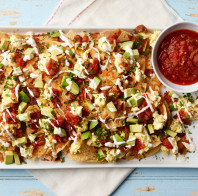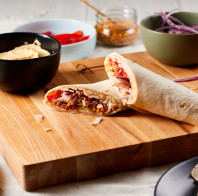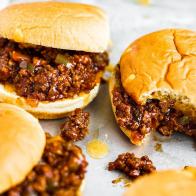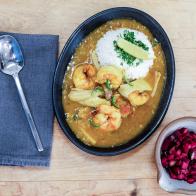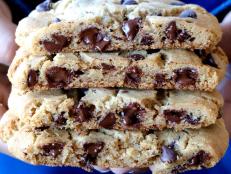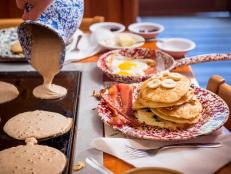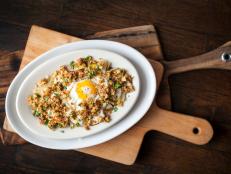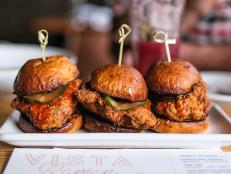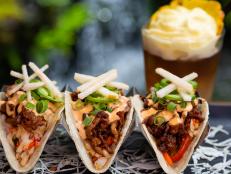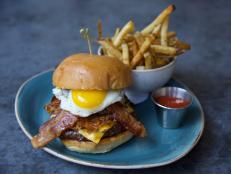The Best Bread Bakeries in America
From standout sourdough to rustic rye to crackly baguettes, here’s where to score loaves from the best bread bakeries from coast to coast.
Photo By: John Lee, courtesy of Chronicle Books
Photo By: Platonic Studios
Photo By: Thomas Schauer
Photo By: Shannon Renfroe
Photo By: Paige McDonald
Photo By: Natalie Chitwood
Photo By: Authentic Asheville
Photo By: Josey Baker
Photo By: Jim Trice
Photo By: Ryan Carr
Photo By: Anna Routh
Photo By: Betty Clicker Photography
Photo By: Andrew Thomas Lee
Photo By: Emily Hutchison
Photo By: Sarah Mackley
Photo By: Jenn Bakos
Photo By: Lauren Barry
Photo By: Denny Culbert Photography
Photo By: Martin Ouimet
Photo By: Lauren DeFilippo
Photo By: Blair Marvin
Photo By: Dave Russo, Log & Hatchet Production Services
Photo By: Keith Plummer, Plumgood Productions
Photo By: Sarah Reynolds North
Photo By: Shaun Thompson Duffy
Photo By: Nate Houge
Photo By: Neal Santos
Photo By: Nicole McConville
Hewn (Evanston, Illinois)
Everything about Hewn exudes a hand-made vibe, from the rustic loaves lining the shelves to the wooden panels fashioned from repurposed pickle barrels. The neighborhood bakery, run by Ellen King and Julie Matthei, is a local favorite in the college town of Evanston, with a well-earned reputation for seeking out (and in some cases, resurrecting) heritage grains and locally grown, organic and stone-milled grains to craft the daily rotating bread selection. Baguettes are a perennially popular pick, as are heritage wheat loaves baked with red fife and red turkey flours. For a taste of the region, opt for the Midwest Blend, which blends Illinois and Wisconsin-grown einkorn, spelt and Glenn wheat, to hardy effect. As a classically trained chef, King can’t help but tinker with savory ingredients, as with the picholine olive-studded country loaf sprinkled with herbes de Provence; an heirloom potato-and-rosemary loaf; or her personal favorite, a rye loaf folded with caramelized onions.
Zak the Baker (Miami)
What began as a bootstrap start-up bakery out of Zak Stern’s garage has blossomed into a full-fledged, certified Kosher bakery in Miami’s Wynwood Arts District. Zak the Baker is a 24-hour-a-day operation; wholesale baking starts at 4 a.m., with morning baguette pick-ups destined for area Whole Foods and dozens of restaurants. By 7 a.m. the morning sun light spills into the cheery bakery and the smell of butter and freshly baked croissants permeates the air. Pro tip: The coveted everything bagels are first out of the oven around 8 a.m., so plan accordingly (get it with nova and cream cheese). By lunch time, the dough room is turning out dozens of naturally leavened loaves. Stern has earned a reputation for the sourdough country wheat, but other standouts include breads that nod to his Jewish culture, such as the sweet braided honey challah, or the sourdough Jewish Rye, one of his personal favorites. Linger for lunch in the perennially packed café to nosh a bagel with whitefish salad or a salmon Rueben on Jewish rye. For Stern, the sky really is the limit: He’s also started baking sourdough, croissants and cookies for select Scandinavian Airlines flights out of Miami.
Bien Cuit (Brooklyn)
Baker Zachary Golper learned to appreciate well-done baguettes as an apprentice in France. Now the name of his Brooklyn Bakery, Bien Cuit, which means 'well done' in French, showcases the style of his dark, deeply caramelized loaves. At first, Golper had to convince people that the loaves — often made with New York grains — weren’t burnt, but now, regulars seek them out for their crackly crusts and supremely flavorful crumb. Even better? Thanks to the thick crust, loaves have a longer shelf life and the flavor improves with time, peaking around three days. Golper is partial to the miche, a classic sourdough loaf made from a wheat-rye flour blend. His kids are fans of the pain de mie, a white flour loaf fermented with milk, whose fluffy crumb makes it ideal for sandwiches and toast. No matter how you slice it, this is bread done well.
Seylou Bakery (Washington, D.C.)
If there was one word to sum up D.C.’s Seylou Bakery, it would be intention. Founders Jonathan Bethony and his wife, Jessica Azeez, opened Seylou not only to bake great bread, but to serve the greater good. Bethony honed his technique and philosophy at Washington State University’s Bread Lab, where he learned the importance of plant variety, farming practices, fresh milling and long fermentation, all key factors to unlocking maximum flavor and nutrition. For sourcing, he found a kindred spirit in Heinz Thomet, who runs a regenerative farm that supplies Seylou with buckwheat, millet, barley, beans and wheat. Grains are milled at the bakery using a New American Stone Mill, and breads are baked in a wood-fired rotating deck oven. (The oven makes a fine centerpiece to the bakery, too.) Perhaps the loaf that best embodies Seylou’s ethos is the Horse Bread, a nutrient-dense loaf featuring Thomet’s corn and millet, which Bethony first slow cooks in the wood-fire oven’s ash to break down the grains and unlock nutrients before adding sorghum, legumes and camelina and mustard seeds to the dough. The flours also find their way into Seylou’s sought-after pastries, including 100% whole-wheat croissants and millet chocolate chip cookies, as well as into the dough destined for the bakery’s Friday pizza night. To make bread accessible to more people, Seylou offers 50% off bread for those on nutrition assistance benefits, and unsold bread is donated to Food Runner US, which distributes the loaves to shelters, soup kitchens and the like.
Union Loafers (St. Louis, Missouri)
Ted Wilson started baking in high school, first making pizza to woo a date — turns out, he fell in love with making dough instead. He baked on and off throughout college, but didn’t pursue it as a profession until he traded his record industry job for a retail gig at Sullivan Street Bakery in New York City in 2006. Wilson begged owner Jim Lahey to be part of bread production; fortunately for Wilson, Lahey took a chance on him, and he’s been baking professionally ever since. Wilson moved back to St. Louis to work at a Neapolitan pizza restaurant where he met Sean Netzer, with whom he co-founded Union Loafers in 2015. They abide by the motto "uncommonly good for the common good," which translates into a bread bakery where locally grown and milled wheat and rye are used in nearly every bread. Get your hands on the Light and Mild, a crackly crusted sourdough loaf with an open, custardy crumb that boasts a slight tang and the creamy sweet flavors of wheat. Naturally, the café’s lunch menu is anchored by bread — ciabatta is baked every hour to supply warm, fresh bread for several of the sandwiches — rounded out by scratch-made salads and soups. At dinner, the dining room turns into a pizzeria slinging 18-inch, NYC-style pies.
Bread Alone Bakery (Kingston, New York)
The folks at Bread Alone are changing the world, one loaf at a time. Daniel Leader started Bread Alone in the early 1980s as a response to the commodification of the food system, particularly grains. As such, the bakery has always valued the farmer-miller-baker relationship; all their mills work with family farms that grow grains on a regenerative rotation. Many of the farmers are also involved in diversity grain trials; as the primary baker in the Catskills, Leader and his wife and co-owner, Sharon Burns-Leader, use their decades of experience with sourdough techniques and small-batch bread to offer feedback and recommendations for particular varietals. As a result, their breads, crafted with organically grown grain and baked in a wood-fired oven, reflect time and terroir. Two signatures include the French sourdough (also known as pain au levain), and the Lefort levain, made from 100% regional grains and named in honor of the Parisian mason who built the bakery’s wood-fired ovens. Both loaves benefit from a long, cool fermentation to coax out a depth of flavor as well as the wheat’s natural sweetness. Pick up a loaf or linger for a sandwich at the main Kingston location, or visit one of the bakery-café locations in Woodstock, Boiceville or Rhinebeck. Though Leader has retired, the couple’s son, Nels, has taken the reins to ensure the future for the next generation of farmers, millers, bread bakers — and a community of bread lovers, too.
Orchard Hill Breadworks (East Alstead, New Hampshire)
Noah Elbers grew up in a creative and resourceful family; they could build everything from a cider press to a bread oven. So, it’s not surprising that he became an entrepreneur himself, opening Orchard Hill Breadworks in the rural town of East Alstead when he was 20 years old. The bakery takes its name from Orchard Hill Farm, which his grandfather and father built in 1972 as a small, U-pick organic apple orchard and cider press. The Breadworks portion of the name reflects Elbers’ dedication to craft and his work ethic. Orchard Hill offers a spectrum of loaves, ranging from a dense, 100% whole grain rye to a light-and-airy challah-style sandwich bread. You can find the breads at local food co-ops, restaurants and farm stands, though the bakery also counts a loyal customer base, including folks who have been buying a loaf a week for 20 years. Many families make Saturday morning pastries a part of their weekend ritual, too. Fan favorites from the pastry case include seasonal danishes, toasted granola cookies and double-dark-chocolate cookies. Orchard Hill is truly a community-supported bakery; thanks to a successful crowdfunding campaign, Elbers will be able to purchase a New American Stone Mill in order to mill flours fresh on-site.
Josey Baker Bread (San Francisco)
What’s in a name? Well, if you’re Josey Baker, your destiny — Baker is the baker-owner of Josey Baker Bread, a San Francisco bakery he opened in 2010. Though Baker has indeed always loved baking, his devotion to grain sourcing and freshly milled flour took root thanks to another well-named individual, Dave Miller, a miller considered by many the godfather of grains. Baker added a mill to his operation in 2013 and today, mills around 400 pounds of flour daily on his New American Stone mill, including red and white wheat, rye, corn, and oats, and occasionally buckwheat and millet. All loaves are crafted with the same sourdough culture Baker got from his great-great-grandmother. Try the Red, White and Rye loaf, an aptly named and balanced whole grain sourdough that boasts a smooth and creamy crumb that’s still got plenty of heft. All loaves benefit from what Baker describes as a bold bake, which shows off a crackly, caramelized crust speckled with char and a supple, moist interior. If you don’t think whole-grain bread is your thing, the Wonder Bread, a fluffy 100% whole-grain sourdough pan loaf, will change your mind.
Boulted Bread (Raleigh, North Carolina)
Since Joshua Bellamy, Sam Kirkpatrick and Fulton Forde founded their Raleigh bakery, Boulted Bread has been synonymous with baking with organic, heirloom grains and house-milled flour on their New American Stone Mill. (Forde helped develop the New American Stone Mills with Andrew Heyn of Elmore Mountain Bread). Drop by for a coffee-and-croissant pick-me-up, then pick up a loaf to-go. The purest expression of their craft is the classic levain, which showcases the beautiful alchemy of flour, salt and water; in this case, 100% freshly milled Turkey Red flour. It’s a big, crusty loaf of bread with a gorgeous open crumb; as Bellamy says, it’d be equally at home at a three-star Michelin restaurant as on your own dining room table. Another standout is the Scandinavian-inspired seeded rye made with a triple dose of rye — rye porridge, rye flour, and rehydrated rye bread, all crafted with heirloom, N.C.-grown Wren's Abruzzi Rye — plus a mix of toasted sesame, sunflower and flax seeds. The flours are also showcased at Benchwarmer Bagels, their downtown Raleigh bagel shop (and bi-weekly pizza-night spot). Turkey Red anchors the dough, but einkorn gives the rounds a deep flavor and tender crumb. For a taste of the South, opt for the grits bagel with pimento cheese. On the sandwich front, try the #1 sandwich with avocado, crispy garlic, radish and charred grapefruit glaze, which is ace on a za’atar and sea salt bagel.
Ibis Bakery (Kansas City, Missouri & Lenaxa, Kansas)
Chris Matsch’s first love is coffee, but his model for sustainable and ethical sourcing of beans extends to grains and bread baking, too. Working directly with farmers is a boon to the local economy, but it also allows Matsch to tap different flours and grains to harness flavor and maximize nutrition. And just as freshly ground beans make all the difference in the cups of Joe served up front, freshly milled flours are the key to Ibis Bakery’s supremely flavorful loaves. Grains are milled in-house using a New American Stone mill; spelt flour is used for baguettes and ciabatta, red wheats and rye for other breads, and white wheat for pastries. The loaf Matsch is most excited about is the rosemary polenta, in which corn grits — sometimes red, sometimes blue — are cooked and then slowly fermented with sourdough starter, folded into a country bread dough, and in a nod to Kansas’ state flower, rolled in sunflower seeds.
La Brea Bakery (Los Angeles)
Since 1989, every single loaf of Los Angeles’ La Brea Bakery bread has incorporated founder Nancy Silverton’s original sourdough starter, made from yeast, flour, water and organic grapes. In fact, the starter is so valuable that it’s kept in a vault in Belgium. Fortunately, the loaves themselves are much easier to find; many Angelenos stop by the bakery-café on a weekly basis to stock up on loaves baked with heirloom grains, spelt flour and Fortuna wheat. (Not local? La Brea breads are sold at several national grocery chains, where par-baked loaves are finished on-site.) La Brea’s airy café is a popular pick for both a casual lunch (the avocado toast on baguette is a sure bet) or sit-down dinner, where the bread service includes a basket of petite chapeau rolls (pictured) served with butter and sea salt. In celebration of the bakery’s 30th anniversary, head baker Jon Davis and Silverton developed the Founders line. Try the Pain Levain, a classic, slow-fermented sourdough, or the Sprouted Multigrain & Seed, a hardy, earthy loaf that incorporates sprouted grain flour and sunflower and pumpkin seeds. Next, Davis is experimenting baking with spices such as turmeric or paprika, and fruit and vegetable flours like banana or pea flour.
La Farm Bakery (Cary, North Carolina)
At La Farm Bakery, breads are baked virtually around the clock, so whether you’re picking up your baguette or sourdough boule first thing in the morning or on your way home from work, you’re guaranteed an ultra-fresh loaf. Master baker Lionel Vatinet has been churning out top-notch artisan bread in Cary since 1999, since expanding to two additional café-retail outposts plus grocery distribution. Vatinet’s passion shines in every hand-crafted loaf, but he’s continually inspired by local, North Carolina-grown and -milled grains. Take the Abruzzi Wren rye, a varietal indigenous to the Carolinas that’s locally grown and milled. The coarse flour lends a dark, nutty flavor to breads and pastries, and because of its high fat content, yields a supremely creamy crumb. Or consider the Piedmont whole wheat (pictured), a 70% whole-grain pan loaf made with an earthy-nutty hard-red winter wheat with a smooth, springy crumb and crisp crust that make it ideal for sandwiches. Speaking of sandwiches, drop by La Farm’s original café for the brunch-ready tartine diablo, topping asiago Parmesan bread with scrambled eggs, Tasso ham, cheddar, tomatoes, jalapenos and avocado.
Sub Rosa Bakery (Richmond, Virginia)
Richmond’s Sub Rosa Bakery started out as an underground subscription bread service in 2009, eventually converting to brick and mortar in 2012. Brother-and-sister team Evrim and Evin Dogu focus on freshly milled, regional grains that are stone-ground in-house, all of which take a starring turn in their naturally leavened breads and pastries. Don’t miss the pide, a fluffy-yet-substantial flatbread that nods to the Dogus’ Turkish roots and comes topped with olive oil and Nigella and sesame seeds (pictured above). The light rye is another stand-out, a subtly peppery loaf that is balanced by hints of honey, cocoa or a sweet earthiness, depending on the varietals used. On the pastry front, don’t miss the sour-cherry-and-pistachio croissant or the Pogaca, a savory Turkish pastry fashioned after the Dogus’ grandmother’s recipe.
Root Baking (Atlanta)
Chris Wilkins discovered bakery life the way many cooks find kitchen life — as a side gig while in graduate school. He fell for life as a baker, fine-tuning his craft under Randy George of Red Hen Bakery before moving to Athens to help open Independent Baking Co. with Thom Leonard, who many credit with the resurgence of heirloom grains. He and his wife, Nicole Lewis-Wilkins, started Root Baking in 2015 with a focus on Southern grains. They relocated from Charleston to Atlanta’s Ponce City Market in 2018, where they sell combinations like a sourdough loaf folded with cooked aromatic Charleston Gold Rice from Anson Mills and benne seeds (pictured). They also incorporate regional ingredients like sorghum and locally grown Cateto corn into a lightly sweet grits-inspired loaf. That combo is also fashioned into a slab-style pie that takes a starring turn on Root Baking’s pizza night, alongside cracker-thin focaccia filled with mozzarella.
Madison Sourdough (Madison, Wisconsin)
Since its founding in 1993, Madison Sourdough has changed owners and moved a few times, but in 2010, employee Andrew Hutchison bought the business and returned the beloved bakery to its original Williamson Street (aka Willy Street) location in Madison’s WilMar neighborhood. Over the years, Hutchison has doubled down on his commitment to Wisconsin-grown grains and in 2015, brought the milling operation in-house. The stone-milled flours are used within 48 hours to harness the fresh flours’ essential oil and wheat germ content, which impart intense flavors and aromas. Hutchison recommends trying the miche, a mixed grain featuring a blend of bread flour, wheat flour and coarsely ground rye flour that gives the loaf its earthy, malty flavor profile. Because of its size (it clocks in at five pounds!), it develops an intensely caramelized crust which contrasts nicely with a sticky, chewy and plentiful crumb. It’s quickly become a staple for locals who buy a half or whole loaf for the week. Snag a table in the café and tuck into one of the miche-based tartines, or sop up a saucy shakshuka with a piece of grilled sourdough.
Seven Stars Bakery (Providence, Rhode Island)
Since Seven Stars Bakery opened in Providence in 2001, its mission has been simple: Bake great stuff. For head baker Sarah Williams, that means using flavorful, freshly milled flour. Since 2015, all flours are stone milled in-house from grains sourced from Maine Grains, including Glenn (a hard-red spring wheat), rye, spelt and oats — to the tune of 2,500 pounds of flour a week. Additionally, Williams opts not to sift any of the bran off the whole grain flour, yielding flours that are 100% whole grain. Each loaf of bread starts with over 50% freshly milled whole wheat flour and/or a 100% whole rye starter, before undergoing a slow fermentation process. It takes three days for a loaf to reach the bakery shelf, and those slow fermenting starters are what imbue the breads with deep flavor and a hint of natural sweetness, not to mention superior texture and a longer shelf life. Try the signature country bread, a rustic, savory sourdough made from a blend of Glenn and rye flours that has a balanced buttery-earthy-tangy flavor profile. In addition to its Providence outposts, Seven Stars also counts locations in Cranston and Pawtucket, and supplies bread to dozens of local restaurants and Rhode Island universities such as Johnson & Wales and Brown.
Red Hen Baking (Middlesex, Vermont)
Though Randy George earned a degree in theater, his Middlesex bakery, Red Hen Baking, has been his stage for 20 years and counting. You might say, then, that grain is his muse. He’s been part of the Vermont-based Northern Grain Growers Association for 15 years and buys 99% of his grain from within 150 miles of the bakery before milling it fresh in-house. Try the Vermont Miche, a big, round French-inspired country loaf crafted with rye, stone-ground wheat flour and unbleached wheat flour. It undergoes a long fermentation and once baked, produces a sourdough-style loaf with beautiful textural contrast: a deep, burnished crust, and an open, uneven crumb, with a depth of flavor that showcases a touch of tang offset by the grains’ subtle sweetness. Breads baked with sprouted grain flours are becoming more popular; for Red Hen’s Sprouternickel, a take on its pumpernickel, George combines actual sprouted grains — spelt and local rye berries — with whole rye flour and sunflower seeds to create a nutritionally dense loaf with a touch of sweetness. On the pastry front, don’t miss the weekend-only maple-glazed sticky bun, crafted with pure Vermont maple syrup, raisins and walnuts.
The Elder Bread (South Bend, Indiana)
Lauren Barry learned to make bread as a chef in Chicago. When she returned to South Bend, she discovered a dearth of good bread. So, she did what any chef would do, and started baking her own. She began selling it through a local co-op, eventually opening The Elder Bread inside Lang Lab, a former furniture factory that’s home to other makers. The local-grain-focused breads include the nutty, earthy buckwheat loaf, which is folded with creme fraiche. It imparts a creamy, funky tang and yields an exceptionally supple crumb. Given her savory cooking background, Barry enjoys dreaming up creative combinations for her pastries too, such as white-miso-ginger cookies and seeded banana bread swirled with tahini. Barry celebrates her passion for both baking and cooking with monthly themed dinners, with recent menus representing central American and Japanese cuisines. Barry flexes her cooking chops, but naturally, the breads take a starring turn, figuring into the bread course or taking the form of croutons, crackers and homemade panko crumbs.
Bellegarde Bakery (New Orleans)
Baker Graison Gill started baking right after he moved to New Orleans in 2009, soon outgrowing the ovens of his Royal Street apartment, then a commercial kitchen, until he opened Bellegarde Bakery. Though he’s always been meticulous about ingredient sourcing, it wasn’t until around 2013 that Gill gave much thought to flour. When he couldn’t find the kinds of freshly milled flours he wanted to work with, Gill took matters into his own hands. Today, Bellegarde mills 3,500 pounds of flour per week on two 40-inch stone mills to produce 7,000 loaves of bread per week. Each of the naturally leavened, slow-fermented loaves is made by hand and baked in a hearth oven. Gill describes the baguette, made with a blend of organic red and white wheats, as crispy, cotton and wheat-y, ideal for pairing with deli meats and hard, sharp cheeses. You’ll find the breads and grains at restaurants around town, including Turkey and the Wolf and La Petite Grocery. The freshly milled flours can also be purchased at the bakery; they take starring turn in local kitchens’ hand made pastas and in Gill’s own line of pastas (which happily, can be ordered online).
Sun Street Breads (Minneapolis, Minnesota)
Solveig Tofte first made a name for herself in the Twin Cities as Turtle Bread Company’s head baker. She made international headlines when, in 2008, she represented the U.S. in the Coupe du Monde de la Boulangerie in France (yes, the World Cup of Bakeries is a thing). In 2011, Tofte and her husband, Martin Ouimet, opened Sun Street Breads, preparing signature crisp, crackly baguettes along with loaves both rustic and fluffy, all crafted with thoughtfully sourced grains and flours. Try the Bergen, a hearty Norwegian-inspired loaf baked with whole wheat and pumpkin seeds and topped with steel-cut oats and sunflower seeds, or the Great Northern, a tender pumpernickel-oat loaf crafted with pumpernickel meal from local outfit Whole Grain Milling. The charming café is perennially packed at breakfast and lunch, where breads feature prominently too. Try the locally famous meatloaf sandwich, housed on slices of the bakery’s Red River Valley Potato Flax bread. Tofte also puts her dough skills to excellent use on Thursday pizza nights; try the bakery’s namesake pie, topped with creme fraiche, bacon, goat cheese and arugula.
Moxie Bread Co. (Louisville, Colorado)
Andy Clark honed his skills as a baker in restaurant gigs throughout high school and college. He went on to work for Whole Foods for 15 years, helping develop their national bread program into a well-oiled machine. In 2015 he opened Moxie Bread Co. just outside Boulder., focusing on organic, heritage grains, which he mills fresh in-house. But that doesn’t mean his breads are dense hippie bricks — Clark’s knack for finding the sweet spot between a high ratio of grains (all breads have around 40% whole grain content) and the light and fluffy crumb people crave is what makes his loaves so sought-after (try the farmhouse levain). Moxie also offers a daily 100% varietal loaf. Clark is endlessly inspired by Turkey Red, an aromatic wheat varietal he describes as having a malty, honey sweetness, and is also a fan of einkorn, a nutty, sweet grain that’s easy to digest, too.
Tartine (San Francisco)
Since Chad Robertson and Elisabeth Prueitt founded Tartine in 2002, their philosophy has been centered on making the best, most flavorful bread possible. A wood-fired oven is responsible for yielding dark, blistered loaves, while a long fermentation produces the signature open crumb and a subtly sweet tang. But the pair firmly believe that better grains equals better flour, which in turn equals better bread. That means working with local mills such as Camas Country Mill, and Cairnspring Mills for their staple bread flour. The Country Loaf is a sterling example of what that flour can do: some of the coarsest bran is removed so the flour retains the softness needed for a tender crumb, but most of the bran, germ and oils stay in the flour, creating a deeply flavorful and nutritious loaf of bread, Head baker Jen Latham likens having access so many different varietals of wheat to going from baking only with vanilla to a whole pantry full of spices. And Tartine’s bakers aren’t the only ones inspired. On the café side, the chefs dream up dishes where breads share equal billing. To wit, a recent special of braised short ribs with sour cream and XO sauce called for charred einkorn flatbread, perfect for mopping up all that luscious sauce. Next, they’re working to perfect a sourdough Sonora flour tortilla.
Easy Tiger (Austin, Texas)
"Easy, Tiger, Slow Down and Stay Awhile" serves as both the tag line and philosophy behind Easy Tiger’s beer garden and bakery in downtown Austin. Slow down and smell the pastries, then munch on a cinnamon knot while you decide which loaves to bring home. The breads reflect baker David Norman’s European travels and decades of baking experience; try the pain au levain, a French-style country bread leavened with a wild yeast sourdough starter and crafted with a mix of unbleached flour, whole spelt and whole rye flour. The rye is another standout, a sturdy, earthy loaf inspired by Norman’s German studies and travels throughout Sweden. Stay awhile and pull up a seat in the beer garden’s patio overlooking Waller Creek. For the ultimate beer garden snack, try the Bavarian-style pretzel with housemade beer cheese for schmearing, or try Norman’s go-to, a classic Bratwurst on a pretzel bun paired with housemade mustard and sauerkraut. You can also find dishes inspired by and utilizing Easy Tiger’s breads at restaurants around town.
Elmore Mountain Bread (Elmore, Vermont)
For fifteen years and counting, Blair Marvin and Andrew Heyn have earned an industry-wide reputation for the small-batch, hearth-baked breads they bake on their 10-acre property in the north-central Vermont town of Elmore. When they discovered freshly milled flours and heritage grains, they decided to go all-in and mill their own flour for Elmore Mountain Bread. Heyn, along with Fulton Ford (who helped found Boulted Bread in Raleigh, North Carolina), built a custom 40-inch, granite mill and in turn, developed New American Stone Mills. Today, there are more than 75 New American Stone Mills around the world. Though Marvin bakes just twice a week, Elmore Mountain produces 700 loaves each day that are destined for local stores and restaurants, particularly in nearby Stowe. Look for the Vermont Redeemer, a single variety wheat sourdough; Thornhill Rye, a sourdough made with stoneground local rye; and Marvin’s favorite, Andama, a traditional New England-style bread in which heirloom cornmeal is cooked into polenta, combined with wheat flour, and sweetened with local dark maple syrup (instead of molasses).
Partybus Bakeshop (New York City)
Jacqueline Eng initially moved to New York City to pursue a career in music, supporting herself by working in restaurants on the side. Eng enjoyed cooking enough to enroll in a bread-baking program, and found she loved baking more than playing. Since then, she’s honed her skills at Petee’s Pie Co., Arcade Bakery, and most recently, as head baker for Altamarea Group. In 2019, Eng struck out on her own and opened Partybus Bakeshop on the Lower East Side, where she bakes with as many Northeast regional grains as possible. The oatmeal porridge bread showcases stone-milled whole wheat flour from Ithaca and top-notch oats from Maine; a fruit and nut baguette showcases the delicate sweetness of sprouted whole wheat flour. You could easily pop by to pick up a loaf of LES sourdough or an everything bagel baguette, but the bakery’s light-flooded space, vibrant, quirky wallpaper and ample seating (by New York standards) invite you to linger over a pistachio-rose croissant or pizza. Eng uses baguette dough to turn out puffy, crisp crust Neapolitan-style pies with toppings such as pistachio pesto and goat cheese. Eng also offers a range of hands-on baking classes including baguettes, pie crust, pizza and croissants.
Night Moves Bread (Biddeford, Maine)
Though baker Kerry Hanney’s bread baking style is rooted in European tradition, the flours she uses are all from Maine-grown grains, particularly rye (Maine has the same growing zone as many European countries associated with rye.). Before opening Night Moves Bread in Bitteford, a coastal town about 25 minutes south of Portland, she made a name for herself with those rye-based loaves. Try the Baltic rye, a slowly fermented sourdough loaf made with 100% rye freshly milled in-house and sprouted rye berries as well as local ingredients such as blackstrap molasses, coffee grounds from Speckled Ax and beer from Banded Brewing Co. For another regional taste, opt for the Anadama, a New England-style cornmeal bread made with nixtamalized corn — Hanney uses buttery, sweet Abenaki flint corn — and black strap molasses. The bread is also served at top restaurants around Portland.
Sullivan Street Bakery (New York City)
Since 1994, Jim Lahey has been baking some of New York’s most sought-after (and oft-imitated) loaves. But before two New York City locations and a Miami outpost of Sullivan Street Bakery, Lahey got his start baking bread at home in a tiny GE oven tricked out with bricks and lined with ceramic tiles. He began selling it at a local outdoor market on Houston Street, toting 120 pounds of bread to the market that first Sunday. Once he sold his first focaccia, there was no turning back. Lahey has long been inspired by Italian breads, and two of his signatures reflect his years of bread studies and travels to the Boot. There’s the pan pugliese, a rustic loaf with a crisp exterior and a loose, open crumb with a spongy texture. Then there’s the pizza bianca alla Romana. The dough’s gooey, bubbly texture makes it Lahey’s favorite bread to make, but once it’s baked into a six-foot, focaccia-style loaf, it’s a fan-favorite to eat too (especially warm). Get one for the road or post up in the café to eat it in sandwich form, say with prosciutto and fresh mozzarella. The café is also locally famous for its Roman-style pizza topped with combinations such as zucchini and Gruyere or potatoes with rosemary. Next up: Lahey is buying his first-ever flour mill to experiment with milling grains.
Independent Baking Co. (Athens, Georgia)
Baker Thom Leonard has been a disciple of grain and baking since the 1970s, when he began researching how grain is transformed into food for a college course. He milled his own flour on a hand-cranked, steel-plated Corona mill, and learned to bake bread with it alongside a faculty family living on the ground floor of his dorm. He continued milling his own flour and honing his skills at bakeries such as Baldwin Hill Bakery in Massachusetts and studying ancient grain varieties at The Land Institute in Kansas before starting WheatFields Bakery in Lawrence, Kansas. When Leonard and his wife moved back to her hometown of Athens, Leonard opened Independent Baking Co. in 2013. He installed a mill shortly thereafter, and since then, all the bakery’s naturally leavened breads are crafted with flour milled from carefully sourced grains. Two standout loaves include the whole wheat (often 100% Turkey Red), which boasts a light texture and open crumb that makes it ideal for sandwiches and toast, and the best-selling multi-grain, an earthy-sweet loaf that gets tons of texture from a blend of tri-color quinoa, millet, oats, sunflower seeds, flax seeds, wheat, rye and spelt.
Breadboard Bakery (Arlington, Massachusetts)
After briefly working as an engineer in Boston, Daisy Chow found her true passion in baking. It wasn’t as much of a leap as it might seem on paper; Chow grew up outside Dallas in her parents’ Chinese restaurant, so she’s always felt at home in the kitchen. After working as a pastry chef in Boston, she began her bread baking career at Clear Flour Bread where she fell in love with the simplicity of the craft. After honing her skills there for 15 years, she struck out on her own and opened Breadboard Bakery in Arlington in 2019. (Breadboard, which is a base for prototyping and combining electrical components, is a nod to her engineering days.) At the charming neighborhood bakery, Chow’s hand-crafted breads incorporate as much regional, freshly milled flour as possible. To wit, the classic sourdough, rye, seeded (as shown above left) and raisin pecan (as shown above right) loaves all showcase 100% Maine Grains. The Danish rye is particularly standout. It’s a dense, moist loaf that Chow says is meant to be sliced thin and eaten with plenty of salted butter (though it’d also be perfect for anchoring a DIY smorrebrod spread at home). Maine Grains’ whole wheat flour also take a starring turn in Breadboard’s pastries, including the staff favorite croissants and an ultra-flaky cinnamon roll made with croissant dough.
Union Special (Raleigh, North Carolina)
A cheery bakeshop and café located in a former Winn Dixie grocery store, Union Special is run by trained pastry chef Andrew Ullom. And his baked goods beckon — by all means, grab a buttermilk croissant or a blue cornmeal cookie — but don’t sleep on the breads. Ullom is a self-professed bread nerd and the loaves he bakes reflect his focus on technique, sourcing and creativity. Pick up the signature Union Sour, a sourdough that’s crafted with North Carolina-milled flours from Lindley Mills, then slow-fermented and baked until the crust is caramelized, and the crumb within is spongy, border-line sticky. The original version is stellar, but Ullom tinkers with add-ins that range from marinated olives to cinnamon-soaked raisins. If you fancy lingering for brunch, try one of the inventive tartines, such as a recent vegan version created by chef Kaylin Fulp that featured a thick slice of grilled sourdough topped with creamed coconut collard greens, mushrooms, fresh herbs and seeds.
The Grain Shed (Spokane, Washington)
True to its name, The Grain Shed goes all in on locally grown and heritage grains, for beers at the namesake brewery and milling it for bread at bakery-café Culture Breads. Sought-after specialty loaves include the Dinklebrot, in which Oberkulmer spelt, a dark red wheat, imbues the pan loaf with a subtle, natural sweetness, and the Sundays-only Khorasan, in which the namesake grain yields a flavor profile that lands somewhere between popcorn and waffles. Another grain with its own calling card is Purple Egyptian, a barley with a sweet, malty flavor that baker Shaun Thompson Duffy likens to raisins, which makes it ideal for baking into brownies as well as bread (pictured). Purple Egyptian also stars in a smooth, malt-focused pale ale that possesses a balanced sweet-bitter finish. Speaking of beer, don’t miss the Wasted Loaf, which uses leftover bread ends to bolster the mash for a Kvass-style beer.
Acme Bread (Berkeley, California)
Steven Sullivan got his start in the restaurant industry working in many roles at Chez Panisse in the 1970s under Alice Waters. He started baking on the side and slowly honing his craft and Waters took notice, eventually asking him to start baking bread for the restaurant in 1980. Sullivan came up with the Upstairs Loaf, named for the restaurant’s second floor café, a multi-grain loaf featuring a blend of wheat and rye flours. Eventually, the bread baking operation overtook the restaurant’s kitchens — while at the same time, it was clear that the Bay Area food community was ready for better bread. With his wife, Suzie, Sullivan opened Acme in 1983 with four loaves, including the Upstairs Loaf, a sweet baguette, challah and the signature pain au levain, a naturally leavened bread that also serves as a base for variations such as the popular whole-wheat walnut. Since then, Acme has crafted up to 100 different breads, each made with the same dedication to craft and integrity. You can find the loaves at Acme’s original Berkley location, the San Francisco Ferry Building Marketplace outpost and at grocery stores around the Bay Area. It’s also a permanent fixture on dozens of restaurant menus around town, including, of course, Chez Panisse.
Brake Bread (Saint Paul, Minnesota)
Before turning Brake Bread into a full-fledged bakery in Saint Paul, co-owners Nate Houge and Micah Taylor started it as a subscription-only bread delivery program. The name’s play on words is meant to remind people to slow down, since all good things, bread included, take time. It’s also fitting since the loaves are delivered by bicycle year-round, no matter how much snow is on the ground. Happily, you can visit their cozy retail bakery for a pastry (try the Scandinavian-inspired Cardamom Spinner) in addition to the naturally leavened bread made with organic grains. The pair also feature at least one loaf that is both 100% locally grown and milled. In that vein, ask for the Batard du Nord, a rustic whole wheat loaf that boasts a tender crumb with a subtle sweetness and lovely maltiness (pictured). For a nod to the Twin Cities’ Nordic roots, try the Wilhemina Rye, with caraway, sunflower and pumpkin seeds.
Lost Bread Company (Philadelphia)
As the son of French parents, Alex Bois counted good bread as a dietary staple. But it became even more crucial for Bois when, after living abroad and contracting a tropical fever, bread was one of the only things he could digest. With Lost Bread, his hope is to make bread a staple for as many people as possible, while still producing nutritious, whole grain loaves crafted with intention. A sterling example is the Seedy Grains loaf, a whole wheat loaf folded with a roasted, malted and smoked grain porridge and toasted seeds such as pumpkin, sunflower, hemp and flax (pictured). On the other end of the spectrum, try the Japanese-inspired milk bread, a light-and-fluffy pan loaf made with hard red spring wheat and fermented with milk. Pastries are crafted with whole grains too, like the sweet-savory (and habit-forming) pretzel shortbread made with freshly milled hard red winter wheat. You can find the breads at Lost Bread’s weekend pop-ups at Howard Street Café, specialty grocers, and farmers’ markets in Philadelphia and New York. Want to dive deeper into grains? Sign up for a grain share box, which includes a 'zine, a loaf of bread, several baked goods and a quart or two of grains, all inspired by a particular grain.
OWL Bakery (Asheville, North Carolina)
Baker Susannah Gebhart named the first loaf of bread she developed Old World Levain; when a fellow baker gave it the acronym OWL, the nickname stuck. When Gebhart opened her Asheville bakery, OWL was especially fitting given her commitment to naturally leavened breads and European-inspired pastries (levain is the French word for leaven). Gebhart sources freshly milled flours from local millers, including whole wheat bread flour from Carolina Ground and heirloom grain flours such as einkorn, buckwheat and heirloom corn and grits from Farm & Sparrow. Try the einkorn loaf, a 50-50 blend of organic bread flour and einkorn flour, which Gebhart lauds for its delicate, creamy, grassy flavor and golden hue. Another perennial favorite is the heritage grit loaf, made with flour and cooked heirloom grits which gives the crumb an incredibly tender texture. (It’s even better toasted, when it takes on a custardy consistency that plays off the crisp, crackly crust.) From the seasonal selection, don’t miss the sought-after sweet potato loaf, starring heirloom sweet potatoes, a whole-wheat-rye flour blend and local sorghum molasses. Next, Gebhart hopes to roll out a single-variety wheat loaf and is experimenting with baking with foraged ingredients such as acorn flour and hickory nuts. All pastries have some whole grain incorporated too; don’t miss the chocolate croissant made with chocolate from local outfit French Broad Chocolate.

